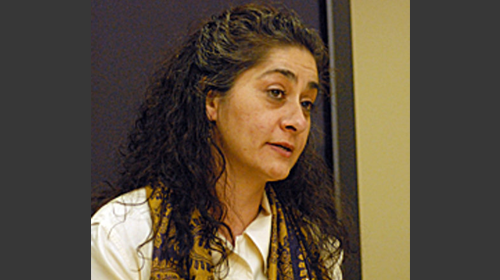Advancing the Human Rights of Survivors of Domestic and Sexual Violence in the U.S.: Progress Report


Two years ago, the Inter-American Commission on Human Rights declared that the United States had violated the rights of Jessica Lenahan, a domestic violence survivor, and her three daughters. Jessica's case initially made headlines when Colorado police refused to act after she reported that her estranged, abusive husband Simon Gonzales had kidnapped their three daughters in violation of a restraining order. She repeatedly pleaded with the police, over a span of ten hours, to rescue the children. The next morning, Simon drove to the police station, opened fire, and was killed; the bodies of the three girls were found in his truck.
After the U.S. Supreme Court held that Jessica had no due process right to enforcement of her restraining order, we represented her in filing a petition with the Commission, which sits in Washington D.C. Its August 2011 ruling marked the first time the Commission had decided a case against the U.S. brought by a domestic violence survivor. The Commission found that the U.S. had violated Jessica and her daughters' rights to life, nondiscrimination, and judicial protection. It then recommended several remedies that would offer redress to Jessica individually and also systemically reform the U.S.' response to domestic violence.
Since the decision, the ACLU and its partners have been working to implement these recommendations. Two years into this process, it's worth asking: what is the role of human rights strategies in advocacy to end violence against women and girls in the U.S.? What progress have we made?
The IACHR ruling spurred advocates to think in new and creative ways about incorporating into litigation, policy advocacy, and organizing strategies to end violence against women and girls here at home. While U.S. law narrowly defines the obligations of governments to survivors, human rights law requires governments to act with "due diligence" – to prevent violence from occurring in the first place, to investigate it when it does occur, and to provide remedies for victims.
We've relied on these principles in briefs we filed with the Court about law enforcement accountability when serving orders of protection and with a Puerto Rico federal court about how the police department there must comprehensively reform the ways it responds to domestic and sexual violence.
We've urged federal policymakers to highlight how discrimination in policing domestic and sexual violence can violate civil rights laws, leading to the Department of Justice's recent announcement that prevention of sex-based discrimination by law enforcement is a "top priority." Recognizing that systemic failures in investigating these crimes constitutes police misconduct, DOJ has entered into agreements with the police departments in New Orleans, Puerto Rico, and Missoula, Montana to strengthen their policies and practices. We've pushed for better policies and training of officers in Colorado, and law enforcement there have since received new training on how to respond to domestic violence. The IACHR ruling also led to the adoption of ordinances declaring freedom from domestic violence to be a fundamental human right in localities including Baltimore, Cincinnati, and Miami-Dade County. Advocates there are now using these ordinances to further the anti-violence work they do in their communities.
The decision in Jessica Lenahan's case has impacted women and girls outside the U.S. as well. Just a few weeks ago, the Kenya High Court cited to it in concluding that police in Kenya had violated the rights of twelve girls by refusing to investigate their reports of sexual assault and child abuse.
So that is all real, concrete progress. But of course we have a long road ahead.
During a recent convening of Move to End Violence, a ten-year initiative of the NoVo Foundation to build the U.S. anti-violence social justice movement, we discussed the root causes of violence against girls and women. These causes are many and multi-layered, but one theme that emerged which struck a chord with me was dehumanization – denigrating others' lives and experiences, and particularly those of survivors. This denigration happens at the individual level – e.g., when a police officer doubted Jessica's report that her children were endangered after being abducted by their father – and at a systemic level – e.g., when the U.S. Supreme Court denied Jessica and other survivors in similar situations any recourse or ability to hold law enforcement accountable in federal courts. The human rights framework resists and fights against that denigration, by focusing on the inherent dignity of each person. And for that reason, I believe that human rights advocacy will continue to be an important tool moving forward.
This post was also featured at On the Move - part of Move to End Violence. Move to End Violence, a program of the NoVo Foundation, is a ten year initiative to strengthen our collective capacity to end violence against girls and women in the U.S. On the Move creates the space for MEV to engage allies in an ongoing effort to learn from the past, envision the future, and share strategies for how we will get there together.
Learn more about domestic violence and other civil liberty issues: Sign up for breaking news alerts, follow us on Twitter, and like us on Facebook.


